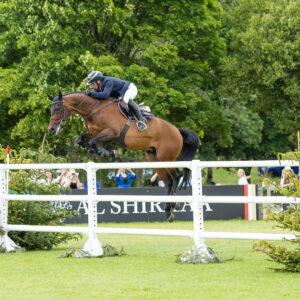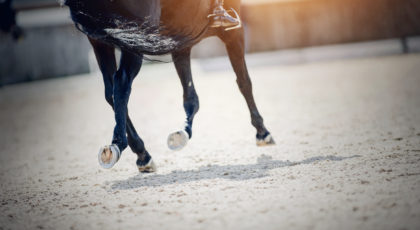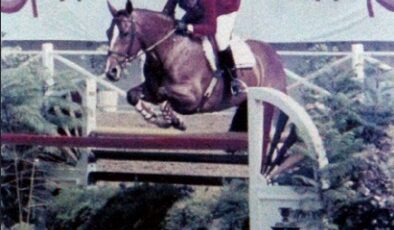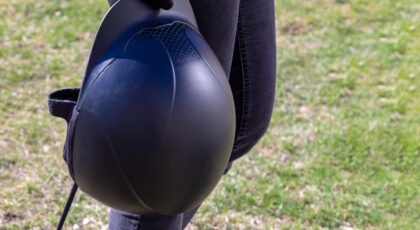True loves to share the arena with other horses: “Woo-hoo! Play time!”
Mares are especially exciting because they’re rare where he lives… and, well, because they’re mares: “Hey, baby! Wanna buck?” And young horses, too: “C’mon, let’s run!” It seems like every young horse is ready to party. When riding a baby, be aware of arena-sharing tactics.
One of the most helpful tricks is to invite a friend with a quiet older horse to ride with you. Horses learn well by observation, and True settles when he has a role model. Sometimes the older horse works alongside True, matching gaits and turns; other times, the two are working in the same arena independently. Either way helps.
The youngster’s new calmness doesn’t only occur while the older horse is there, but also lingers after he leaves. And it transfers to arena work on other days with other horses. Not too quickly, but it does.
The magnet effect is strong when another horse enters the arena while True and I are working. He knows he cannot simply charge over there to introduce himself (though he tried that once or twice in his first arena rides). Instead, he l-e-a-n-s toward the other horse. True also speeds up when approaching another horse from any direction and slows down when moving away from that horse.
Knowing his standard mode of operation helps me to apply and remove leg pressure as needed, to keep him at a consistent pace. Redirecting his attention toward me also helps, though it’s a constant struggle at first. I reward him with strokes, praise, and rest breaks when he works past his friends without the magnet effect, and soon he learns what is expected.
Sometimes True works while his pasture-mate is also in the arena. These two get along very well. So well that the only time Trooper actually misbehaved under saddle (as opposed to misunderstood or did not know) occurred when his buddy left the arena.
We cantered past the gate as the other horse was leaving. True looked, but continued cantering in response to my leg. We cantered on halfway around the arena before True expressed his opinion. Very suddenly, he spun 90 degrees at the canter, flipped his head up, and bolted toward the gate to follow his friend. An interesting tool in his little arsenal of mischief!
I pulled him up on the third stride using a one-rein stop, then returned to the rail and resumed the canter. We circled there for a while, just to make sure he didn’t try it again. He didn’t. Horses have many methods of learning, and testing is one of them.
Another lesson for young horses in sharing arenas is to allow other horses to pass. My experience with many youngsters over the years is that most riders do not understand that a young animal needs more space. When passing, give a baby at least 20 feet of space between one horse and the other. Over time, this space will gradually decrease.
Oncoming passage is even trickier. True is quite perturbed by horses coming toward him with only a few feet to spare. If something goes wrong, both horses and both riders will be in danger, so ask friends to give your baby a wide berth.
Finally, let’s not forget the antics of pasture horses next to an arena. Every now and then, two or three horses in an adjacent pasture buck, fart, and take off hell bent for election. It’s really hard for a three-year-old to experience that without reacting. They’re herd animals, after all. So if you happen to be in the equine facility design business, please don’t do this to us. Physically separate the arena from locations where other horses are running loose.
With positive arena experiences, young horses learn to work calmly while other horses pass from both directions. The magnet effect recedes, and the youngster needs less space around other animals.
Standard arena etiquette is helpful, like oncoming passage from left shoulder to left shoulder. Verbal comments are appreciated, like “outside,” “inside,” or “rail.” If you’re riding a young horse, feel free to smile and ask other riders to please give him extra space. Do the same when someone else is on a green bean. It really helps, and everyone will appreciate your considerate attitude.
Related reading:
Janet Jones will present “Brain to Brain: Cross-Species Communication between Horses and Riders” at the World Equestrian Center in Ocala, Florida, on March 14, 2024. Come to the talk and enjoy the international Winter Spectacular Hunter/Jumper Horse Show too. Learn more and reserve your tickets at https://janet-jones.com/product/janet-jones-ticket-sales.

A version of this story originally appeared on janet-jones.com. It is reprinted here with permission.


 January 31, 2024
January 31, 2024 

























